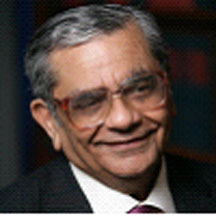– Jagdish Bhagwati and Arvind Panagariya
Jagdish Bhagwati is Senior Fellow at the Council on Foreign Relations and Professor of Economics and Law at Columbia University. Arvind Panagariya is Professor of Economics and of Indian Political Economy at Columbia University.

NEW YORK – Politics in Asia’s two giants, India and China, has suddenly turned very uncertain. China remains in authoritarian mode, of course. But egregious human-rights violations and suppression of dissent are raising the specter of growing internal disruptions, particularly in the wake of purges within the top leadership.
By contrast, India, with its firmly rooted liberal democracy, smells to some like roses. But many believe that India, too, faces uncertain political prospects.
In particular, there is widespread belief in India today that one of the country’s two main political parties, the Indian National Congress, essentially run by Sonia Gandhi and her son, Rahul Gandhi, has now run its course and will sink into oblivion. According to The Economist: “The Congress Party…is in a funk” and “in danger of…long-term decline.”
But the Congress has been written off before: the article from The Economist was published in January 2003. Indeed, the uniform prediction prior to the 2004 election was that, after having lost three elections in a row, the Congress was heading for its fourth defeat and eventual dissolution. Yet it won that election, and then won a second parliamentary election in 2009.
Politics is, of course, full of reversals of fortune. But, unlike in 2004, it is unlikely, for several reasons, that the Congress can survive the dire predicament that it now faces today.
For starters, in 2004, the Congress was challenging an incumbent government that had served for six years. This time, the Congress has formed the incumbent government for two consecutive terms, and its tenure has recently been marked by scandals that have made it look ineffectual, rudderless, and corrupt. To make matters worse, India is experiencing a sharp economic slowdown, further undermining the Congress’s prospects in elections that must be held no later than June 2014.
Second, and more important, voter attitudes have shifted significantly during the past decade. Average annual economic growth of 8.5% over the eight-year period from 2003 to 2011 has led to a revolution of perceived possibilities. As the economists Poonam Gupta and Arvind Panagariya have demonstrated, voters in most Indian states now support leaders and parties that deliver good economic outcomes, and turn out those who do not. This marks a major shift from the fatalistic attitudes of the past, which generally helped incumbents, who benefited from voters’ belief that there was no real alternative to existing arrangements.
This voting behaviour has been reinforced by recent examples of political failure and success. Brazenly corrupt leaders such as Kumari Mayawati of Uttar Pradesh and Digambar Kamat of Goa were each bundled out after one term. Meanwhile, positive role models like Nitish Kumar of Bihar, Narendra Modi of Gujarat, and Navin Patnaik of Orissa have all been returned to power as Chief Ministers at least once; all have delivered remarkable results while maintaining an unblemished record of personal integrity. The Congress will inevitably be under acute pressure to perform, as the electorate now knows that better performance is not beyond its grasp.
Prime Minister Rajiv Gandhi’s assassination over two decades ago created a wave of sympathy for his widow, Sonia, on whose sari-tails the Congress won in 2004. Today, no such tragedy is likely to help the Congress. Sonia Gandhi is rumoured to have cancer, but, rather than capitalizing on it, she has kept the details within the walls of the Gandhi family compound in New Delhi.
But the real problem is that brand-name politics is increasingly at a discount in India, much as it is in the United States. Like the Kennedy and Bush brands, the Nehru-Gandhi label has lost its lustre in India.
That is partly a function of rapidly changing demographics. Individuals born after 1975 now account for a very large proportion of the electorate. For these voters, Jawaharlal Nehru and Indira Gandhi are merely historical figures, and are a distant memory even for many voters born before 1975. It is not surprising that Rahul Gandhi proved unable to bring the Congress a victory in a recent election in a constituency that historically had been a bastion of support for his family.
Indeed, the Nehru-Gandhi condominium that has dominated Indian politics has itself undermined the party’s survival prospects by making it immensely difficult for it to recruit and develop new leaders. It is common knowledge that, for the last eight years, Sonia Gandhi has exercised virtually total control within the party. As a result, no rival to Rahul Gandhi has emerged.
With Sonia Gandhi in ill health, Rahul unable to connect to the electorate even in his historically “safe” constituency, and the Nehru-Gandhi brand name having lost its appeal, the prospects for the Congress in 2014 look bleak. Only the outcome will tell whether it can survive.
Copyright: Project Syndicate, 2012. www.project-syndicate.org
